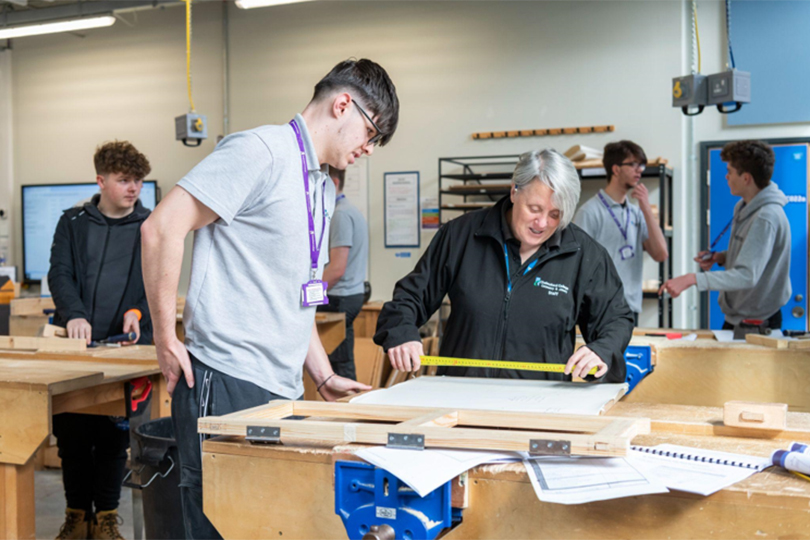Blog | What Are Higher Technical Qualifications (HTQs)?

Pearson’s Higher Technical Qualifications (HTQ-approved) fill the fundamental gap between traditional academic pathways and the skills required by today’s industries.
These vocational qualifications provide practical, technical knowledge directly applicable to the workforce, with a significant impact across key sectors such as construction, civil engineering, engineering, healthcare and digital technologies. Each qualification has been approved against employer-developed standards for specific job roles, ensuring learners gain the skills that businesses need most.
Who Are Higher Technical Qualifications (HTQs) For?
Employers: HTQs present a valuable opportunity to upskill their staff. By investing in HTQs for your workforce, you can ensure that they meet industry standards and drive your business forward.
Learners: For individuals who have completed secondary education and are seeking an alternative to a university degree, HTQs offer clear pathways into employment or further study. If you’re looking to advance your career, some HTQs are an excellent option for progression.
Practical learners will especially benefit, as HTQs include work placements and simulated work environments designed to provide real-world experience and skills that can be directly transferred to the workplace.
HTQs are suitable for learners of all ages, from young adults just finishing school to experienced professionals looking to retrain or upskill.
Whether you’re starting out, changing careers or developing expertise in your current role, HTQs provide flexible and practical pathways to support your goals. They can also be an excellent option for those considering a career change later in life, as we explored in our recent article on changing careers at 30, 40, or 50.
Different Types of Qualifications (HTQ vs HNC vs HND)
There are 3 different types of higher education qualifications, each offering different levels of study and career pathways. Higher Technical Qualifications (HTQs) are level 4 and 5 qualifications approved by employers and IfATE to meet industry standards. Higher National Certificates (HNCs) are level 4 qualifications that provide a strong foundation in a subject area. Higher National Diplomas (HNDs) are level 5 qualifications, usually studied over two years, offering more advanced knowledge and skills, often with the option to progress directly into the final year of a degree.
Here is a summarised breakdown:
HTQs: Level 4 or 5 qualifications endorsed by IfATE and employers, focused on industry-relevant skills.
HNCs: Level 4 builds a solid subject foundation.
HNDs: Level 5, typically two years of study, providing deeper knowledge and potential entry to the final year of a degree.
To learn more about how these higher technical qualifications differ, check out our blog on HNCs vs HNDs. It will help you gain a better understanding and decide which option is right for you.
What Qualifications Are Available at Chelmsford College?
There are a variety of Higher Education Qualifications available across different sectors, giving learners the flexibility to choose a pathway that matches their career goals and interests. Some of these include:
Construction:
• Level 4 HNC Civil Engineering for England
• Level 4 HNC Construction Management for England – Construction Design and Build Technician
Engineering:
• Level 4 HNC in Engineering
Health & Social Care:
• Level 4 HNC in Healthcare Professions’ Support for England
• Level 5 HND in Healthcare Professions’ Support for England
ICT & Digital Skills:
• Level 4 HTQ Diploma: Cyber Security Engineer
• Level 4 HTQ in Software Development
Do HTQs Have Entry Requirements?
Yes, each HTQ, HNC, and HND has its own entry requirements, which can vary depending on the subject and level of study. In most cases, you’ll need to have completed Level 3 qualifications (such as A-Levels, T Levels or a relevant vocational diploma).
Some courses may also require specific subjects or prior work experience, particularly in technical fields like engineering, healthcare or digital. Mature learners without formal qualifications may still be considered if they can demonstrate relevant industry experience or skills.
How Long Do HTQ, HNCs & HNDs Take to Complete?
Most HTQs, HNCs and HNDs are designed to be studied part-time, typically requiring one day per week over two years. This flexible structure makes them ideal for those who want to continue working while studying or for employers who wish to release staff for training without significant disruption.
Some courses may also be available on a full-time basis, which can shorten the duration to around one year for an HNC and two years for an HND.
How Much Do HTQs Cost at Chelmsford College?
HTQs are a quicker, more affordable and practical alternative to a degree. While some people want a degree, HTQs offer a shorter pathway into careers with high earning potential. They’re hands-on, cost less and focus on specific skills, so you can start working sooner with less debt. HTQs can also lead to a full degree later if you choose.
Chelmsford College Course Fees:
• Year 1: £3500
• Year 2: £3500
As an employer, you may wish to contribute or fully pay tuition fees, as an investment in your workforce or as part of a benefits package.
If you are self-funding, then you can find out about financial support here
How Do I Apply?
Select one of the qualifications listed above, click ‘Apply Now,’ and complete the online application form through our website.
Once submitted, a member of our admissions team will be in touch to guide you through the next steps of your application.
Need Help or Have Questions?
If you’re unsure or have any questions before submitting your application, our admissions team will be happy to help. Get in touch using the contact details below:
Jackie Northedge (Business Development Consultant):
Tel: 07795 847354
Email: northedgej@chelmsford.ac.uk